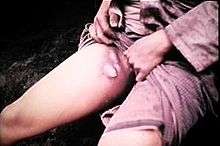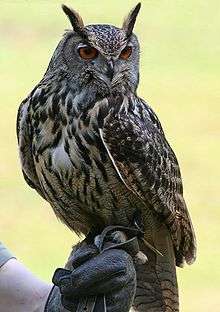Definify.com
Webster 1913 Edition
Bubo
Bu′bo
Webster 1828 Edition
Bubo
BU'BO
,Definition 2026
Bubo
Bubo
Translingual
Proper noun
Bubo m
Hypernyms
- (genus): Aves - class; Saurornithes - informal group; Ornithothoraces, Ornithurae - clades; Carinatae - subclass; Neornithes - infraclass; Neognathae - parvclass; Strigiformes - order; Strigidae - family; Striginae - subfamily
Hyponyms
- (genus): Bubo bubo (Eurasian eagle owl) - type species; for other species see
 Bubo on Wikispecies.Wikispecies
Bubo on Wikispecies.Wikispecies
References
- Gill, F. and Wright, M. (2006) Birds of the World: Recommended English Names, Princeton University Press, ISBN 978-0691128276
bubo
bubo
English

Noun
bubo (plural buboes)
- (pathology) An inflamed swelling of a lymph node, especially in the armpit or the groin, due to an infection such as bubonic plague, gonorrhea, tuberculosis or syphilis.
Derived terms
Translations
Esperanto
Etymology
From German Bube (“boy, knave”).
Noun
bubo (accusative singular bubon, plural buboj, accusative plural bubojn)
See also
| Playing cards in Esperanto · ludkartoj (layout · text) | ||||||
|---|---|---|---|---|---|---|
| |
|
|
|
|
|
|
| aso | duo | trio | kvaro | kvino | seso | sepo |

|

|

|

|

|

|

|
| oko | naŭo | deko | fanto, bubo | damo | reĝo | ĵokero |
Ido
Etymology
Noun
bubo (plural bubi)
- urchin, waif, street Arab, kid (living on street), gamin
Derived terms
- bubacho (“rascal, rogue”)
Latin

Etymology 1
From Proto-Indo-European *b(e)u (“owl”), see also Ancient Greek βύας (búas), Bulgarian буч (buč), Old Armenian բուէճ (buēč), and North Persian بوم (bum). The Indo-European root is onomatopoeic and was borrowed into Semitic languages such as Arabic بُوم (būm) and Classical Syriac ܒܐܘܐ (baʾwāʾ) and Caucasian languages such as Old Georgian ბუვი (buvi), Chechen бухӏа (buha), and Aghul бу́гьу.[1]
Alternative forms
- *būfo (Vulgar Latin)
Pronunciation
- (Classical) IPA(key): /ˈbuː.boː/
Noun
būbō m (genitive būbōnis); third declension
- an owl, especially the Eurasian eagle owl, Bubo bubo.
Usage notes
Nearly always masculine, but used once as a feminine noun by Virgil in Aeneis IV:462:
- hinc exaudiri voces et verba vocantis
- visa viri, nox cum terras obscura teneret,
- solaque culminibus ferali carmine bubo
- saepe queri et longas in fletum ducere voces;
Inflection
Third declension.
| Case | Singular | Plural |
|---|---|---|
| nominative | būbō | būbōnēs |
| genitive | būbōnis | būbōnum |
| dative | būbōnī | būbōnibus |
| accusative | būbōnem | būbōnēs |
| ablative | būbōne | būbōnibus |
| vocative | būbō | būbōnēs |
Derived terms
Descendants
References
- ↑ Encyclopedia of Indo-European Culture, Mallory, Adams
Etymology 2
Medieval Latin; from Ancient Greek βουβών (boubṓn, “groin, swelling”).
Pronunciation
- (Classical) IPA(key): /ˈbuː.boː/
Noun
būbō m (genitive būbōnis); third declension
- (Medieval Latin) Alternative form of būbōnēs
Etymology 3
From būtiō (“bittern”)
Pronunciation
- (Classical) IPA(key): /ˈbu.boː/
Verb
bubō (present infinitive bubere); third conjugation, no perfect or supine forms
References
- bubo in Charlton T. Lewis and Charles Short (1879) A Latin Dictionary, Oxford: Clarendon Press
- bubo in Charlton T. Lewis (1891) An Elementary Latin Dictionary, New York: Harper & Brothers
- BUBO in Charles du Fresne du Cange’s Glossarium Mediæ et Infimæ Latinitatis (augmented edition, 1883–1887)
- Félix Gaffiot (1934), “bubo”, in Dictionnaire Illustré Latin-Français, Paris: Hachette.
- bubo in Harry Thurston Peck, editor (1898) Harper's Dictionary of Classical Antiquities, New York: Harper & Brothers